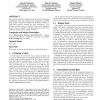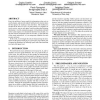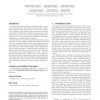150
click to vote
AIRWEB
2008
Springer
15 years 4 months ago
2008
Springer
The annotation of web sites in social bookmarking systems has become a popular way to manage and find information on the web. The community structure of such systems attracts spam...
142
click to vote
AIRWEB
2008
Springer
15 years 4 months ago
2008
Springer
Online social media draws heavily on active reader participation, such as voting or rating of news stories, articles, or responses to a question. This user feedback is invaluable ...
138
click to vote
AIRWEB
2008
Springer
15 years 4 months ago
2008
Springer
We study the usability of linguistic features in the Web spam classification task. The features were computed on two Web spam corpora: Webspam-Uk2006 and Webspam-Uk2007, we make t...
137
click to vote
AIRWEB
2008
Springer
15 years 4 months ago
2008
Springer
Every day millions of users search for information on the web via search engines, and provide implicit feedback to the results shown for their queries by clicking or not onto them...
132
click to vote
AIRWEB
2008
Springer
15 years 4 months ago
2008
Springer
Since the link structure of the web is an important element in ranking systems on search engines, web spammers widely use the link structure of the web to increase the rank of the...
AIRWEB
2008
Springer
15 years 4 months ago
2008
Springer
119
click to vote
AIRWEB
2008
Springer
15 years 4 months ago
2008
Springer
Combating Web spam has become one of the top challenges for Web search engines. State-of-the-art spam detection techniques are usually designed for specific known types of Web spa...
111
click to vote
AIRWEB
2008
Springer
15 years 4 months ago
2008
Springer
This paper focuses on analyzing (Japanese) splogs based on various characteristics of keywords contained in them. We estimate the behavior of spammers when creating splogs from ot...
136
click to vote
AIRWEB
2008
Springer
15 years 4 months ago
2008
Springer
As web search providers seek to improve both relevance and response times, they are challenged by the ever-increasing tax of automated search query traffic. Third party systems in...



